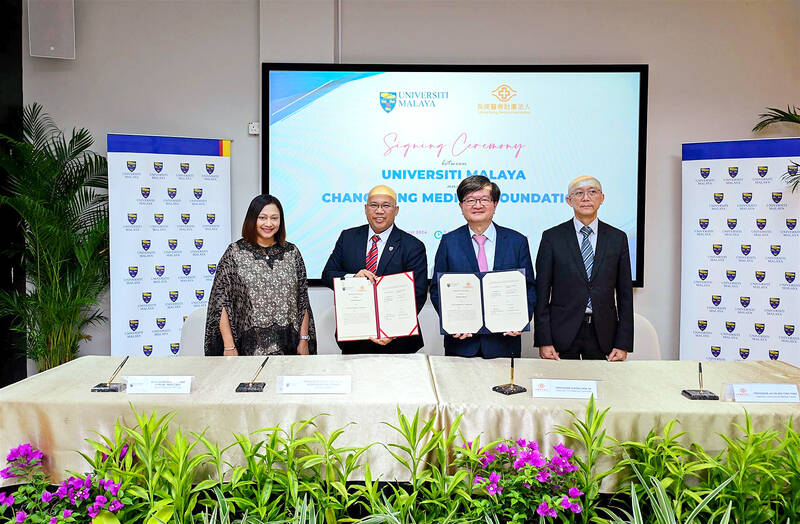The Chang Gung Medical Foundation has signed memorandums of understanding (MOU) with the University of Malaya and Sunway Medical Center in Malaysia.
Through a Ministry of Health and Welfare project formulated under the framework of the New Southbound Policy, the three institutions would cooperate in the areas of medical technology, professional talent training, medical research, and two-way referral services for international patients, foundation chairman Cheng Wen-chun (程文俊) said.
The foundation has been active in exchanges in Malaysia since 2019, and the MOU would be the latest in a series of cooperative projects in the country, he said.

Photo courtesy of Chang Gung Memorial Hospital
The MOU was signed at the university on Aug. 23 by Cheng and University of Malaya vice chancellor Noor Azuan Abu Osman.
Then, Cheng and Sunway Medical Center general manager of hospital and medical operations Khoo Chow Huat signed another MOU on Aug. 24.
“The University of Malaya and its affiliated hospital to the University of Malaya have a long history, and are among the world’s leading medical research institutions,” Cheng said.
“The goals of the university, and of Sunway Medical Center, align with ours at the Chang Gung Medical Foundation,” he said.
Sunway Medical Center is the largest private medical institution in Malaysia. Established in 1999, it has gained reputation in Malaysia for its advanced medical equipment, modern facilities and professional medical team, Cheng said, adding that the center regularly attracts patients from other countries.
Chang Gung Memorial Hospital International Medical Center chairman Feng Szu-chung (馮思中) said that the upcoming exchange would be “Advanced Medical Technology: Current Situation and Future Prospects.”
The most recent exchange was a seminar co-organized with the University of Malaya, during which Chang Gung Memorial Foundation experts shared a number of cutting-edge medical technologies, Feng said.
Technologies demonstrated at the seminar included the Da Vinci robotic surgery system, proton therapy, artificial intelligence applications and immune cell therapy, he said.

Three batches of banana sauce imported from the Philippines were intercepted at the border after they were found to contain the banned industrial dye Orange G, the Food and Drug Administration (FDA) said yesterday. From today through Sept. 2 next year, all seasoning sauces from the Philippines are to be subject to the FDA’s strictest border inspection, meaning 100 percent testing for illegal dyes before entry is allowed, it said in a statement. Orange G is an industrial coloring agent that is not permitted for food use in Taiwan or internationally, said Cheng Wei-chih (鄭維智), head of the FDA’s Northern Center for

LOOKING NORTH: The base would enhance the military’s awareness of activities in the Bashi Channel, which China Coast Guard ships have been frequenting, an expert said The Philippine Navy on Thursday last week inaugurated a forward operating base in the country’s northern most province of Batanes, which at 185km from Taiwan would be strategically important in a military conflict in the Taiwan Strait. The Philippine Daily Inquirer quoted Northern Luzon Command Commander Lieutenant General Fernyl Buca as saying that the base in Mahatao would bolster the country’s northern defenses and response capabilities. The base is also a response to the “irregular presence this month of armed” of China Coast Guard vessels frequenting the Bashi Channel in the Luzon Strait just south of Taiwan, the paper reported, citing a

UNDER PRESSURE: The report cited numerous events that have happened this year to show increased coercion from China, such as military drills and legal threats The Chinese Communist Party (CCP) aims to reinforce its “one China” principle and the idea that Taiwan belongs to the People’s Republic of China by hosting celebratory events this year for the 80th anniversary of the end of World War II, the “retrocession” of Taiwan and the establishment of the UN, the Mainland Affairs Council (MAC) said in its latest report to the Legislative Yuan. Taking advantage of the significant anniversaries, Chinese officials are attempting to assert China’s sovereignty over Taiwan through interviews with international news media and cross-strait exchange events, the report said. Beijing intends to reinforce its “one China” principle

A total lunar eclipse, an astronomical event often referred to as a “blood moon,” would be visible to sky watchers in Taiwan starting just before midnight on Sunday night, the Taipei Astronomical Museum said. The phenomenon is also called “blood moon” due to the reddish-orange hue it takes on as the Earth passes directly between the sun and the moon, completely blocking direct sunlight from reaching the lunar surface. The only light is refracted by the Earth’s atmosphere, and its red wavelengths are bent toward the moon, illuminating it in a dramatic crimson light. Describing the event as the most important astronomical phenomenon